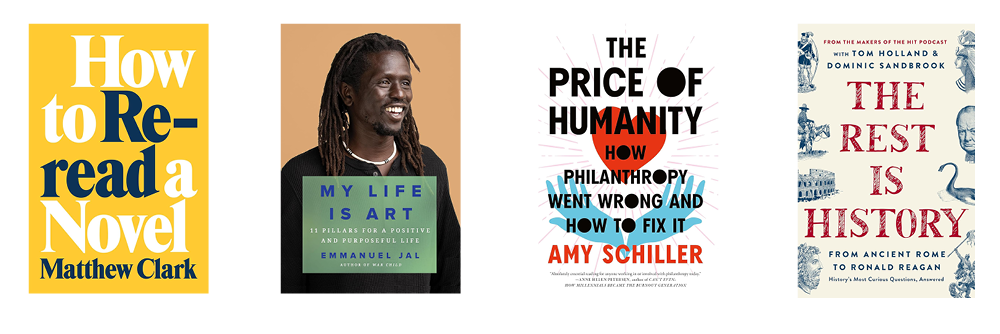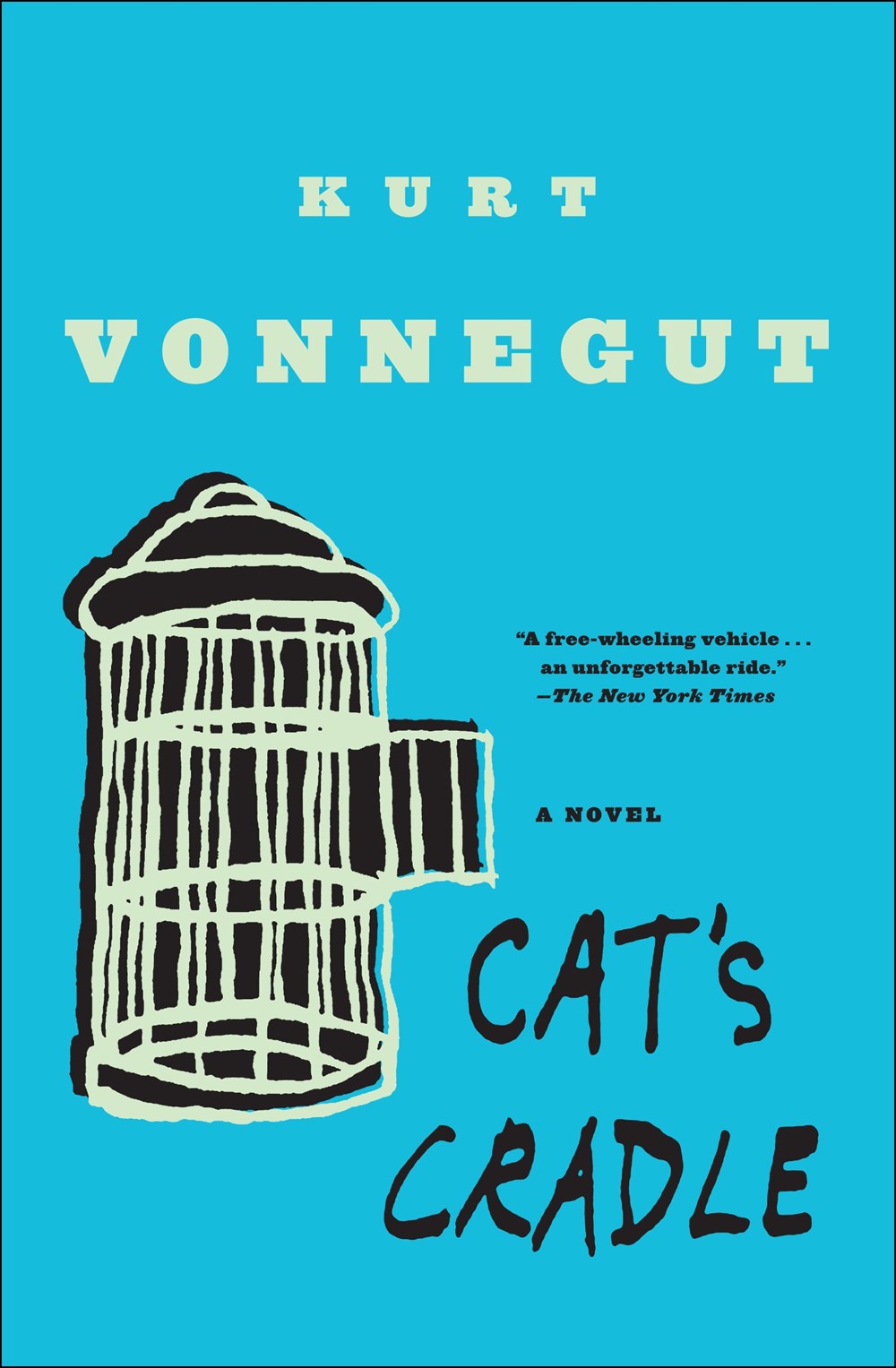December 5, 2023
Finding the right book at the right time can transform your life or your organization. We help you discover your next great read by showcasing four recently released titles each week.
The books are chosen by Porchlight's Managing Director, Sally Haldorson, and the marketing team: Dylan Schleicher, Gabbi Cisneros, and Jasmine Gonzalez. (Book descriptions are provided by the publisher unless otherwise noted.)
This week, our choices are:

Jasmine’s pick: How to Reread a Novel by Matthew Clark, LSU Press
A novel is among the most intricate of human creations, the result of thousands of choices and decisions. In How to Reread a Novel, Matthew Clark explicates the intricacies of fiction writing through practical analysis of the resources of narration, demystifying some of the tools novelists use to build worlds.
Drawing on classical philology, the rhetorical tradition, and recent approaches to narratology, Clark explores reading fiction as a complex experience of perception, cognition, and emotion, in which the writer of a narrative attempts to create and control the experience of the reader through the deployment of narrative techniques. Texts examined range from the Iliad and the Odyssey to contemporary literature, including detailed discussions of novels by Jane Austen, Charles Dickens, Henry James, and Raymond Chandler, as Clark investigates fundamental methodologies of narrative storytelling and the effects they employ to form beauty and meaning.
By exploring some of the central techniques of narrative composition, How to Reread a Novel helps uncover subtleties in a text that may be missed on a first reading, encouraging readers to go beyond the surface to see what creates the unique experience of reading fiction.
Gabbi’s pick: My Life Is Art: 11 Pillars for a Positive and Purposeful Life by Emmanuel Jal, Counterpoint
“Who owns your mind?” Beginning with this provocative question, Emmanuel Jal invites readers to claim ownership over the narratives that define their lives in order to become a force for good in the world.
As a child growing up in South Sudan, Jal witnessed atrocities perpetrated against his family and community. These actions drove him to become a child soldier in a vicious civil war. Hunger, isolation, and the ever-present specter of death in battle attended his every moment. Yet his greatest challenge did not come from outside; it arose from within, from the corrosive nature of hopelessness, trauma, and narratives of victimization.
Rather than succumb to these forces of negativity, Jal turned his life’s challenges into opportunities by utilizing a comprehensive framework he developed around eleven pillars of support. These pillars can be utilized individually or as a unit to help build a durable internal structure that allows anyone to overcome adversity, regain joy and gratitude, and live a life of purpose that enriches the greater community.
Dylan’s pick: The Price of Humanity: How Philanthropy Went Wrong—And How to Fix It by Amy Schiller, Melville House
The word “philanthropy” today makes people think big money—Bill and Melinda Gates, Warren Buffet, and Andrew Carnegie come to mind. The scope of suffering in the world seems to demand an industry of giving, and yet for all the billions that are dispensed, the wealthy never seem to lose any of their money and nothing seems to change.
Journalist, academic and consultant Amy Schiller shows how we get out of this stalemate by evaluating the history of philanthropy from the ideas of St. Augustine to the work of Lebron James. She argues philanthropy’s contemporary tendency to maintain obscene inequality and reduce every cause to dehumanizing technocratic terms is unacceptable, while maintaining an optimism about the soul and potential of philanthropy in principle.
For philanthropy to get back to its literal roots—the love of humanity—Schiller argues that philanthropy can no longer be premised around basic survival. Public institutions must assume that burden so that philanthropy can shift its focus to initiatives that allow us to flourish into happier, more fulfilled human beings. Philanthropy has to get out of the business of saving lives if we are to save humanity.
Sally’s pick: The Rest Is History: From Ancient Rome to Ronald Reagan—History's Most Curious Questions, Answered by Goalhanger Podcasts, PublicAffairs
The Rest Is History podcast brilliantly distills major moments in human history, covering everything from the Trojan War to a historical ranking of the greatest dogs. Now, this official tie-in book brings the chart-topping podcast’s charms to the page, offering readers a fresh, wide-ranging tour of humanity’s essential, and essentially weird, moments, including:
- Did the Trojan War actually happen?
- What was the most disastrous party in history?
- Was Richard Nixon more like Caligula or Claudius?
- How did a hair appointment almost blow Churchill’s cover?
- Why did the Nazis believe they were descended from Atlantis?
Featuring an introduction from podcast hosts Tom Holland and Dominic Sandbrook, this book cleverly demonstrates that the past—from modern to ancient and every time in between—is both closer to us than we might realize and bafflingly strange, all at once. So run your Egyptian milk bath, strap up your best Spartan sandals, and prepare for a journey down the highways and byways of the human past.
WHAT WE'VE BEEN READING AT HOME
 "Cat's Cradle by Kurt Vonnegut, Jr. Re-read this over Thanksgiving and was so glad I did. If you only ever read a single Vonnegut story, this is the one to read. Pound-for-pound, you'd be hard-pressed to find a book with as much humor, philosophy, and sadness in every page. As humanity seems currently poised to blindly chase AI toward whatever end it might bring, it's almost possible to forget that nuclear energy even exists, or that it still remains such a volatile threat to our existence."
"Cat's Cradle by Kurt Vonnegut, Jr. Re-read this over Thanksgiving and was so glad I did. If you only ever read a single Vonnegut story, this is the one to read. Pound-for-pound, you'd be hard-pressed to find a book with as much humor, philosophy, and sadness in every page. As humanity seems currently poised to blindly chase AI toward whatever end it might bring, it's almost possible to forget that nuclear energy even exists, or that it still remains such a volatile threat to our existence."
—Michael Jantz, Logistics Director



